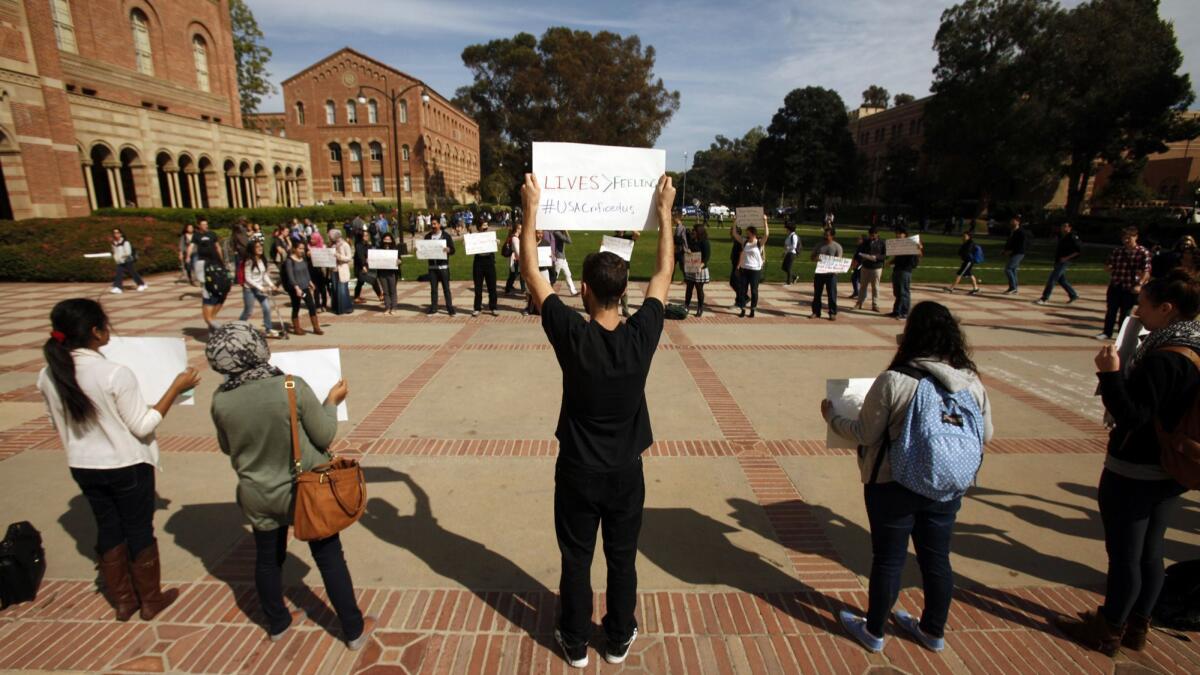Op-Ed: Boycotting Israel won’t end the Palestinian tragedy

- Share via
JERUSALEM—Airbnb recently announced that it is boycotting tiny Abkhazia and South Ossetia. The ostensible reason for the boycott is that these are contested territories. The Abkhazians and the South Ossetians, with Russian backing, have seceded from Georgia and declared their independence, moves rejected by the international community.
But Airbnb’s real motive for stigmatizing a forlorn corner of the world, with a population of under a quarter-million, is to prove that the house-sharing company has no special animus toward Israel.
In November, Airbnb decided that residents in West Bank settlements could no longer list their homes on its website. It was only after the company faced strong criticism for stigmatizing the Jewish state — or at the least fellow-traveling with the Boycott, Divest and Sanction movement against Israel — that Airbnb added two obscure slivers of Georgia to its list of taboo territories. In fact, Airbnb began its absurd action against Abkhazians and South Ossetians just as Florida was moving toward sanctions against the company for its selective boycott of Israel.
Is our flawed democracy more morally offensive than the world’s many dictatorships?
Like many Israelis, I hope for a two-state solution to the Israel-Palestinian conflict. I oppose West Bank settlement building and am prepared, as part of a peace agreement that would ensure Israel’s ability to remain a Jewish and democratic state, to cede territory that is the historic heart of the Jewish homeland. Ruling over another people is, morally and politically, a disaster for my country. The Palestinian tragedy has gone on too long, with one generation after another growing up under occupation.
But boycotting Israel, even selectively, won’t bring an end to the conflict or the tragedy. It will have the opposite effect. Israelis have developed an extraordinary resilience under pressure: Our nation was born in a war of attempted destruction and hasn’t known a day of genuine peace ever since. Terrorist enclaves allied with Iran are ensconced along our borders. And we are no stranger to boycotts: For 70 years, we have been boycotted by most of the Arab and Muslim world, along with their allies.
The movement to boycott, divest and sanction fundamentally misreads the Israeli temperament. When Israelis feel unfairly judged, they don’t recoil but push back. And most Israelis are convinced that the call for boycotts is profoundly unfair.
Partly that’s because Israelis don’t believe their country deserves unique opprobrium. The U.N. denounces Israel for its human rights violations, real and imagined, more often than it denounces violations in all other countries combined. Yet rather than eliciting contrition, the resolutions convince Israelis that the international community isn’t motivated by genuine concern for the Palestinians’ plight but by hatred for the world’s only Jewish state. Israelis shrug: The Jews have been here before, and we’ll survive this too.
They respond in a similar way to calls to boycott, divest and sanction. Is our flawed democracy more morally offensive than the world’s many dictatorships?
If Airbnb were truly committed to placing principle over business, Israelis argue, it could bar listings by property owners in Tibet, brutally occupied by China; or northern Cyprus, seized by Turkey; or the Western Sahara, occupied by Morocco. But Airbnb won’t jeopardize its business interests in China, Turkey or Morocco by targeting those countries. Only Israel — and those bits of Georgia — get that treatment.
Israelis vehemently reject the notion that their country is primarily responsible for the impasse with the Palestinians. To understand that position, consider how Israelis interpret two crucial dates. The first is December 2000, when President Clinton proposed a two-state solution. According to the mainstream Israeli narrative, the Israeli government said yes and Palestinian leaders rejected the offer, opting for four years of suicide bombings known as the second intifada.
The second watershed is July 2005, when Israel unilaterally uprooted its settlements and army bases in the Gaza Strip and withdrew to the international border. That withdrawal was met by years of rocket attacks launched from Gaza on Israeli communities.
Enter the Fray: First takes on the news of the minute »
Israelis believe that their country tried to end the occupation and the Palestinian leadership responded with terrorism. For that reason, the argument that Israel holds all the power gets nowhere here. Israelis believe the conflict isn’t ultimately about occupation but the right of a Jewish-majority state to exist in any borders.
Even a selective boycott reinforces the perception that Israel alone is responsible for the impasse. And such a one-sided condemnation empowers the xenophobic right in Israel, which insists that the world remains implacably hostile to the Jewish people and the only response is resistance. Rather than incite Jewish fears, the international community should hold Israeli and Palestinian leaders accountable for moves that undermine peace. Do not condemn Israel for settlement expansion without also condemning the Palestinian campaign, in media and schools, that denies Israel’s legitimacy and even the historical rootedness of Jews in the land we share with the Palestinians.
Airbnb is embarrassing itself with its transparent boycott of Abkhazia and South Ossetia. It should not engage in efforts that drive Israelis and Palestinians further apart and alienate even Israeli liberals.
Yossi Klein Halevi is a senior fellow of the Shalom Hartman Institute and author of “Letters to My Palestinian Neighbor.” He is chairman of Open House, a coexistence project that brings together Arab and Jewish Israeli citizens.
Follow the Opinion section on Twitter @latimesopinion and Facebook
More to Read
A cure for the common opinion
Get thought-provoking perspectives with our weekly newsletter.
You may occasionally receive promotional content from the Los Angeles Times.









